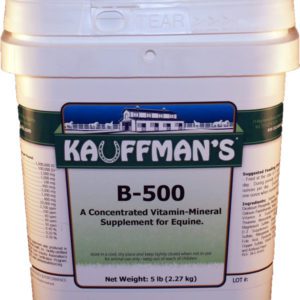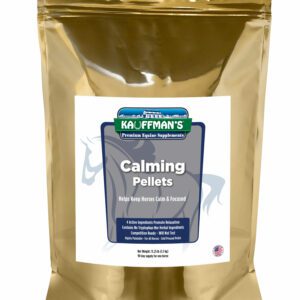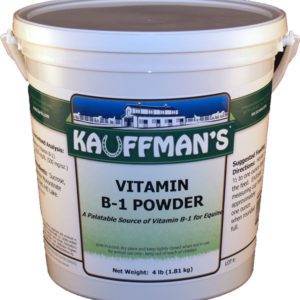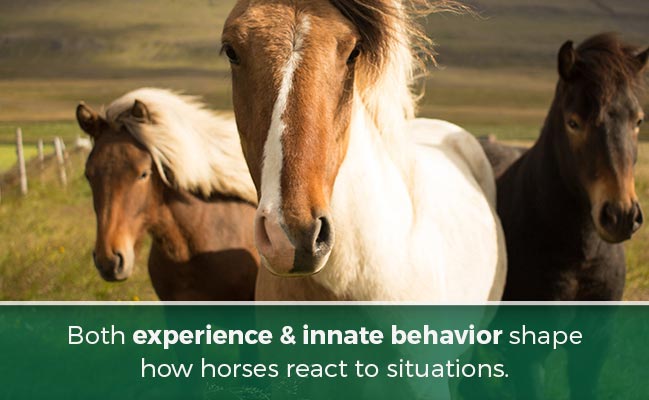How to Deal With Your Horse’s Anxiety
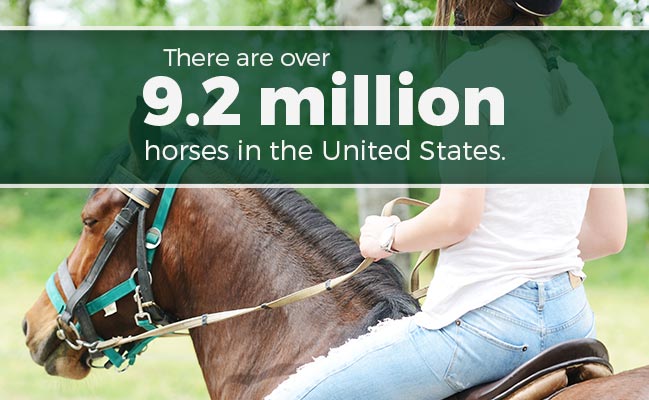
There are over 9.2 million horses in the United States, according to the American Horse Council Foundation, within that population are horses that suffer from anxiety.
-
 B-500$38.40 – $147.50
B-500$38.40 – $147.50 -
 KAUFFMAN’S® Calming Pellets$104.49 – $428.85
KAUFFMAN’S® Calming Pellets$104.49 – $428.85 -
 Vitamin B-1 Supplement$28.20 – $142.60
Vitamin B-1 Supplement$28.20 – $142.60
Many everyday situations can cause anxiety in horses. The two most common types of horse anxiety problems are separation anxiety and performance anxiety. Each stems from a different cause and requires a unique approach based on both an understanding of a horse’s instinctual behavior and health needs.
Getting to the root of your horse’s anxiety issues may take some time and detective work. The more time you spend with your horse, the more you will observe his behavior and find clues about what triggers his anxiety. You may not be able to entirely change his behavior, but removing the source of his anxiety, and providing nutritional support and attention to his surroundings, can help you teach your horse to be calm and trusting in most situations.
Understanding the Mind of the Horse
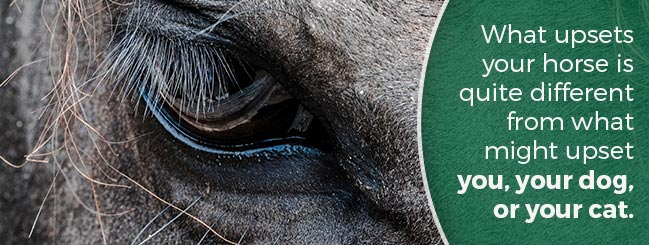
To understand anxiety in horses, you must first understand the mind of a horse. What upsets your horse is quite different from what might upset you, your dog, or your cat. That is because horses are herd animals and herbivores. In the wild, they are a prey species — lunch for predators. That makes them by nature more prone to flight than fight when something scary appears.
Your horse is hard-wired to run first and ask questions later. As horses evolved, the ones who ran faster, or who ran first, survived attacks by predators. Those horses with the best reaction times survived attacks and passed on those characteristics to their offspring. The result is an animal that is sensitive to certain things that remind him of predators creeping about, or other things that might threaten his well-being.
Herd Mentality
Horses are herd animals. Herd animals seek companionship in order to feel safe. There is a clear pecking order in a herd — especially in a herd of horses. A “boss mare,” or alpha mare, leads the herd with a strong stallion as guardian. Other mares form the ranks behind her.
Safety is found in numbers in a herd. When wolves attack, the more herd members there are, the less likely you’ll be picked out from the herd and eaten.
Natural Instincts Conflict with Human Needs
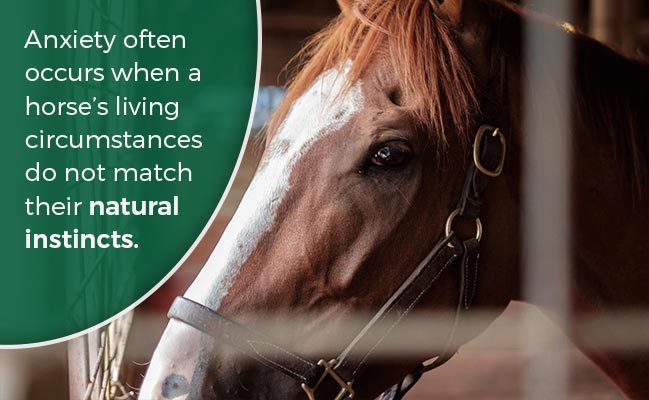
Among horses, anxiety often occurs when their living circumstances don’t match their natural instincts. Think about your horse’s life from his perspective for a minute.
His natural instinct is to be with a herd, yet he spends most of his time in a 12’ x 12’ box stall.
His natural instinct is to walk all day long; finding grazing areas and eating constant, small amounts so as not to stress his small stomach, yet fill his long, sensitive digestive tract. Instead, we put horses on our own schedules, feeding them grain or pellets in the morning and at night, and supplementing with hay a few times a day.
Pasture and turnout depend on where your horse is stabled. If he’s at a boarding stable, he may receive individual turnout to prevent accidents like bites or kicks from other horses. That’s great for you and prevents vet bills, but your horse may be lonely.
We take horses to shows, with loudspeakers blaring at them, candy wrappers flapping in the arena, crowds cheering and air brakes hissing. No wonder horses that are calm at home may spook in the show ring. It’s anxiety and stress, but of a different kind than we humans experience.
Mixed Signals Increase Anxiety
Lastly, we have trained horses to be our companions and willing partners in all types of athletic competitions: show jumping, dressage, fox hunting, barrel racing, competitive trail and more. Horses want to please us. If we are learners alongside our horses, we may give them mixed signals. The horse, eager to please, becomes anxious at the strange signals and unanticipated corrections. Anxiety and stress result from mixed signals.
Learn and Respond to Your Horse’s Behavior
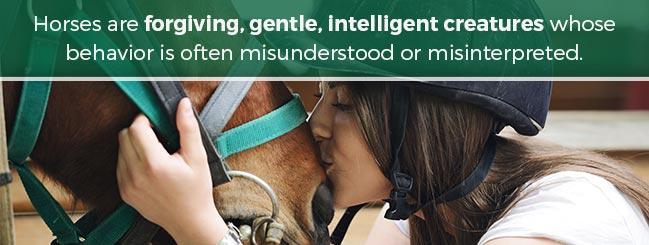
With so many possible scenarios that increase anxiety and stress for horses, it’s a wonder we can ride them at all! This only proves just how wonderful horses are, both as companions and as trusted friends. They are forgiving, gentle, intelligent creatures whose behavior is often misunderstood or misinterpreted.
Common Symptoms of Horse Anxiety
There are several common symptoms of horse anxiety that you can learn to watch for and address.
- Weaving and stall walking: This includes horses who weave-walk from side to side or sway. They may take two steps to the right, two to the left, and continue for hours as if in a trance. Stall walking is related to weaving, but horses generally walk around in circles rather than bob side-to-side. Both weaving and walking, according to the Merck Veterinary Manual, are signs of stress, boredom and anxiety in horses. They can cause strain on the joints and ligaments. Horses that weave and stall walk may be underweight because they burn excess calories.
- Shaking or trembling: Horses may shake or tremble while being ridden, led or simply while standing. Their skin seems to ripple and you can visibly see it twitch.
- Rolling eyes: A horse that rolls his eyes is frightened. You can see the whites. His posture may be tense, or he may tremble while rolling the eyes.
- Backing into a corner: Horses who are afraid seek the fastest way to leave a scary situation. If confined to a stall, they may back themselves into a corner.
- Rearing: Horses rear to strike with their front legs. Rearing may be a sign of fright.
- Spooking or bolting: A horse that spooks suddenly veers from the object that startled him. Horses may spook and then bolt, which means to run off. Horses may bolt while being ridden or led.
The Causes of Horse Anxiety
Both experience and innate behavior shape how horses react to situations. The most common causes of horse anxiety include:
- Separation anxiety: Separation anxiety is caused by moving a horse away from herd mates. Horses who are turned out together may dislike being moved from the pasture into the stable for grooming and saddling. They may try to bolt or return to the horse. Conversely, a horse ridden alone in the riding arena may attempt to bolt and return to the relative safety of the barn, where he knows there are other horses.
- Performance anxiety: Horses, like people, can become anxious before events. Sometimes, they simply pick up on our nonverbal anxiety cues, like feeling their riders tense or hang onto the reins a little too tightly. Other horses learn to associate the sights, smells and sounds of competition with anxiety. Thoroughbreds that are used to giving their all at the racetrack may transfer this performance anxiety to their new lives, even though the stakes are much lower. They are unable to distinguish between the noises of the track and the noise of the country fair, where their new owners take them to an unrated show. To them, it is still time to perform, and they tense up in anticipation of the event.
- Situational anxiety: Situational anxiety occurs when horses associate a particular situation with something bad happening. A horse that may have been in a trailer accident as a youngster may associate stepping into the trailer with the pain and fear of the accident, even though years have passed between now and the time of the accident. Such anxiety can be difficult to diagnose if you have a new horse or don’t know your horse’s history. You may know when he gets anxious, but aren’t sure why.
- Boredom: Although you may not think that boredom and anxiety are synonymous, horses who are bored may also be anxious. These are generally the stall walkers and weavers. They don’t have enough to do, and this makes them anxious.
- Change anxiety: Lastly, change anxiety occurs when a horse’s living conditions are abruptly changed. Moving a horse from a big, open pasture into a confined stable and a heavy training schedule without any transition can be stressful for him. Some horses dislike having different riders each day and aren’t well-suited to being lesson or rented-trail horses. These horses react poorly to change and exhibit the telltale signs of anxiety, such as eye-rolling, avoidance and backing, spooking and bolting.
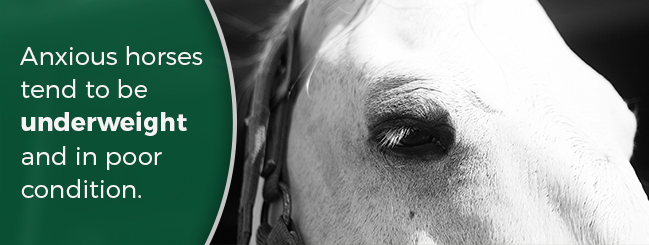
Anxiety can lead to many health problems in horses. Anxious horses tend to be underweight and in poor condition. They’re burning up calories faster than they can process them.. They may also have a lackluster coat and even their hoof health can suffer if they aren’t receiving proper nutrients.
Anxious horses may be more prone to colic or enteroliths, stone-like impactions of feces and undigested fiber that can cause serious impaction colic. Anxious horses can damage their hooves, joints and ligaments from constant weaving and walking.
Horses that bolt, run or spook can end up with an injury. A horse that rears can hurt his head. Head trauma in horses is fortunately rare, but very dangerous — and preventing it is far better than a frantic call to the vet.
Lastly, anxious horses can be unwanted horses. A horse who wears grooves into the stall floor from repeated walking, spooks and injures his rider, or can’t be ridden away from his pasture-mates can be seen as a problem horse, and one that’s difficult to place with all but the most experienced owner. With patience, time and training, such problems can be solved, but with so many horses available on the market without these problems, it can be difficult to find homes for them.
Anxiety: What You Can Do
There are some steps that you can take on your own, or with the help of a skilled trainer, to ease your horse’s anxieties. The first thing to do is to have your veterinarian examine your horse to make sure his behavior isn’t due to an undiagnosed physical condition. Pain can manifest as anxiety, especially if the pain is related to being saddled or ridden.
Once your horse has a clean bill of health, it’s time to start helping your horse feel more confident and secure. If you have recently purchased your horse, you may need to spend time at the barn getting to know him and helping him become familiar with you, too. Groom your horse, hand graze him and get to know him in situations away from the external stressors that cause him anxiety.
Other things you can do to mitigate your horse’s anxiety include:
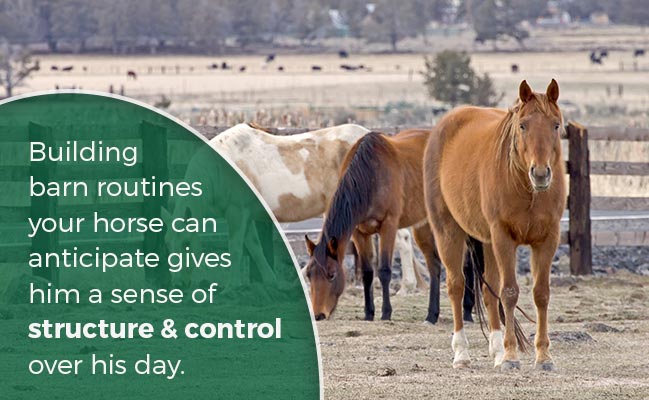
- Establish a routine: All animals, including horses, feel better with some structure in their day and in their environment. Building barn routines your horse can anticipate gives him a sense of structure and control over his day. Feed your horse at the same time every day, and turn him out around the same time.
- Minimize change: Manage major changes in your horse’s environment, such as a new barn or stable, a new pasture mate or a new pasture, as slowly as possible. Give him time to acclimate to his new surroundings before expecting him to work. Show him around his new pasture, leading him around the fence line and allowing him to sniff it and explore his environment. Try to avoid big upheavals as much as possible.
- Work with a trainer: You may be giving your horse nonverbal cues while you’re riding that signal stress, anxiety or fear. This can cause your horse to overreact or startle, and creates an anxiety-inducing situation for you both. A good trainer can spot subtle changes in your body language, such as tense shoulders, tight hands, heels creeping up and so on, which can give your horse fear-signals. Working on your posture, breath control, and your own riding skills will make you a better partner with your horse.
- Use precise aids: Horses who anxiously anticipate what their riders want may overcompensate in the arena, trying to please their riders with their fast responses. Jumpers who take off too soon, however, can cause accidents, and rushing dressage or reining tests can lead to bad scores or disqualification. Precise aids on your part can help reduce tension in your horse. The more your horse learns to read your aids, the clearer the communications between rider and horse, and the more your horse can relax because he understands the job you want him to do.
- Check your tack: It’s amazing how changing your bit or adjusting the saddle can help your horse relax. Often, pain manifests as anxiety. If your weight on the saddle pinches a horse’s withers, the horse may become afraid of the saddle and show anxiety. Harsh bits, improper saddle fit and pinching girths can all lead to anxiety in your horse. If you’re not sure how to check saddle fit, ask your trainer, an experienced horse person or your local tack shop to see if a saddle fitter is available to check your saddle. It may be as simple as having the panels re-stuffed on an English saddle or swapping a string girth for a leather one.
- Groundwork: Trust-building exercises on the ground can also help. These include leading your horse around “scary” obstacles, like a tarp on the ground, or other trail-type exercises that gently expose him to objects that may be strange, spooky or scary. Natural horsemanship, which emphasizes trust and teamwork without punishment, may also be an ideal way to improve your bond with your horse and help you regain his trust.
- Get more exercise: Some horses simply have a lot of pent-up energy. This can cause anxiety and stall vices like weaving or walking. More exercise, especially longer training sessions to build stamina, can burn off excess energy. Longer turnout with pasture friends can also help your horse feel less tense.
- Lunge: Lunging your horse before you ride can also help him work off some of the “spooks,” or tension. If you’ve never lunged a horse before, ask your trainer to teach you how to safely and properly use the long line.
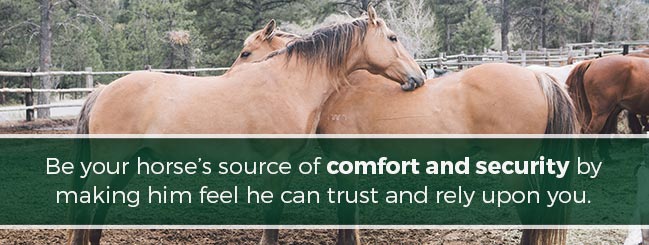
- Always reward, sometimes correct, never punish: Be your horse’s source of comfort and security by making him feel he can trust and rely upon you. Always reward good behavior with lavish praise, gently correct improper behavior, and never punish your horse. All of this helps a horse relax.
- Ride with a buddy: If your horse experiences separation anxiety away from the barn or herd, ride with a buddy so he gradually becomes accustomed to being out on his own. It’s also safer for you to ride with a friend.
- Acclimate your horse to new situations: Acclimate your horse to new places, people and things slowly. Instead of rushing to your first horse show or rodeo together, bring him along in the trailer as a companion for an experienced horse so he gets to see, smell and experience the stimulation of competition without any pressure. If you are adopting an off-the-track racehorse, give him a few weeks of turnout with no expectations of riding, training or showing to let him come off his racetrack experience and get used to life as a pleasure horse.
- Consider supplements: Certain nutritional supplements promote calmness in anxiety-prone horses. Supplements such as Kauffman’s® Calming Pellets can help reduce tension and anxiety in your horse.
Working With Situational Anxiety in Horses
Situational anxiety can be one of the most puzzling anxieties to deal with in horses. A normally calm, cooperative horse becomes fractious about one particular task. If you can trace the anxiety back to its root, you can work with your horse using calm, positive reinforcement. Take small steps to get him to walk past an obstacle, stand for the farrier or whatever other behavior you want to accomplish.
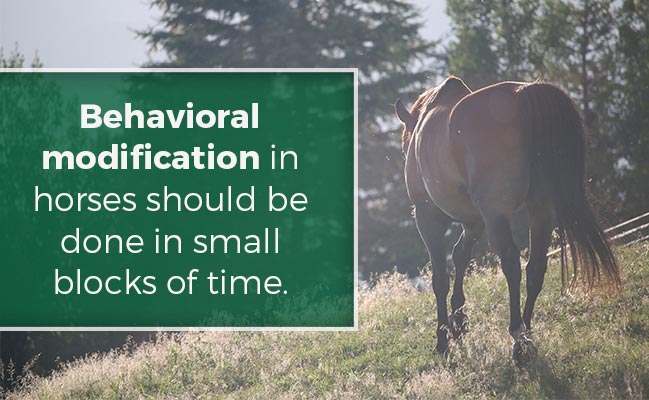
Behavioral modification in horses should be done in small blocks of time. Repeat the tasks frequently. Use food rewards, praise and affection to help your horse understand he has accomplished the tasks you’ve set before him.
Sedative Drugs: Should You Use Them?
Your veterinarian may suggest sedative drugs to keep your anxious horse from wearing himself to a frazzle. Whether or not you use them is a personal choice, but there are natural alternatives, such as supplements and training exercises, that can work equally well, if not better.
Sedatives tend to make horses sleepy and dull. They can be more prone to tripping, and less active and alert. Many sedatives are also banned by the governing bodies of equestrian sports and breed shows, so you cannot use them during competition. It is often better to find a natural alternative that doesn’t impact your horse’s performance but helps his anxiety levels.
Easing Anxiety in Horses: Help Is in Your Hands
Easing anxiety in horses is possible. With teamwork between your trainer and veterinarian, along with plenty of patience and gentle training, you can help your horse feel confident and comfortable in many situations once again. Go slowly, and always keep your horse’s best interests in mind.
One simple way in which you can help your horse is by improving his nutrition. Nutrients in hay may vary according to the season and place of production. Supplements such as Kauffman’s® Calming Pellets provide balanced nutrition to help your horse maintain a calm yet active demeanor.
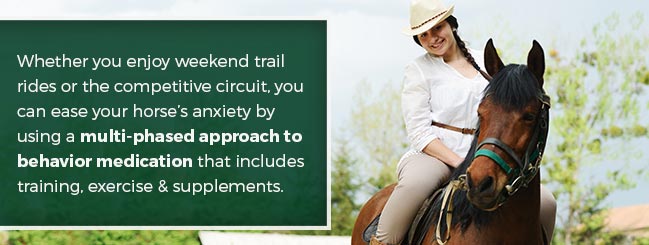
Kauffman’s® Calming Pellets contain a mix of vitamins, minerals and nutritional supplements for a healthy nervous system, calm mind and glowing coat. Whether you enjoy weekend trail rides or the competitive circuit, you can ease your horse’s anxiety by using a multi-phased approach to behavior medication that includes training, exercise and supplements. Kauffman’s® Calming Pellets can help.
To learn more, visit the Kauffman’s® website.

